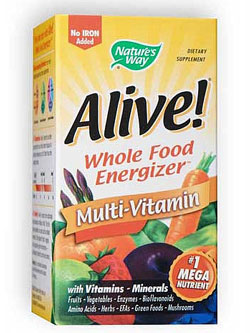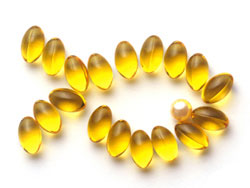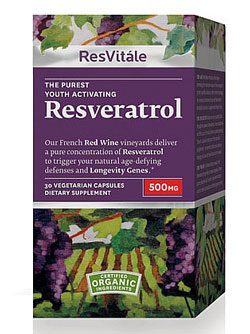Dr. Tanya Edwards reveals the vitamins every over-fifty woman needs to feel truly fab.
(We’ll have a shopping list for you at the end.)
The Multi
 What’s the most important vitamin that everyone should be taking?
What’s the most important vitamin that everyone should be taking?
- A multivitamin. Because none of us get 100 percent of everything that we absolutely need. Our standard American diet is grossly lacking in so many things.
- Are all multi-vitamins the same?
- I prefer a whole food multi vitamin. They’re made from food as opposed to synthetics. The theory–and this is based on theory and not necessarily clinical trials–is that whole food vitamins are in the proportions that you find in food and contain enzymes to help those vitamins work together. More like nature wants it.
- How do you know if a vitamin is “whole food”?
- If it doesn’t say it right on the packaging, then it’s not.
- What if you’re a very healthy eater—do you still need supplements?
- Even if your diet has plenty of fruits and vegetables, there have been so many changes in our U.S. farming practices, that often the soil is depleted of the minerals you need.
- The other issue is, much of our produce is shipped from far away. When produce is shipped, it has to be picked before it’s ripe, so it doesn’t have all the nutrients that it should. If a banana ripens en route to your grocery store, it’s not gaining the nutrients that it would have gained if it were ripening on the tree.
- I’ve noticed some multis have iron and some don’t—does it matter?
- If you are over 50 and still menstruating, you should take a multi with iron. If you’ve stopped menstruating, you should take one without iron—as long as you’re not anemic. Most multis with iron contain the recommended daily dose–18 milligrams per day.
- If you take more than the recommended dosage of something, is that bad?
- It can be for a lot of vitamins, including iron. Having extra iron in your body can act as a catalyst for oxidation–the production of free radicals. Those are the bad guys that cause disease. So having exactly the amount of iron that you need–no more, no less–is really important.
Fish Oil
 Why should we take fish oil?
Why should we take fish oil?
- Because we are all deficient in omega 3 fatty acids.
- What do those do?
- Omega 3s are one of two essential fats our bodies need. The other is omega 6. We get way too many omega 6s in our diets and not nearly enough omega 3s. That tips the balance and causes inflammation. Omega 3s are highly anti-inflammatory.
- Where do we get all these omega 6s?
- Omega 6s are found in many nuts and seeds and also vegetables, vegetable oil and corn oil. Thirty years ago, when we were told to stop using lard in cooking, we all switched to vegetable oils. Now we have a lot of vegetable oils in our diets.
- That’s not to say that omega 6s are not important. Our immune system uses them to mount a response and kill off viruses, bugs, cancer cells and those kinds of things. But omega 3s are your counter balance. They help to dampen the immune response. If you are eating way too many omega 6s and not enough omega 3s, your inflammatory response goes unabated.
- And what happens in your body?
- You have inflammation, which has proven to be the underlying cause of just about all of the diseases that we suffer from: heart attacks, strokes, cancer, high blood pressure and diabetes.
- So I better run out and get this fish oil.
- Absolutely.
- What about flax seed oil? Isn’t that omega 3?
- I don’t recommend flax seed oil as your omega 3. That’s the short chain omega 3; you need the long chain that is found only either in fish or algae.
- Algae?
- My vegan patients take an algae supplement, otherwise I recommend fish oil.
Vitamin D
 Tell me why people need D.
Tell me why people need D.
- D comes from the sun, but in the last 50 years our society has gone indoors. We were supposed to be outside, scantily clothed. As we’ve moved further away from the equator and indoors, we are not getting nearly enough. Fifteen years ago we thought vitamin D was only related to calcium in bone density, but now we know it’s related to hundreds of diseases. If you’re deficient, you have an increased risk for heart attack, Parkinson’s disease, Alzheimer’s, autism, high blood pressure…
- But you wouldn’t develop autism as an adult, would you?
- No, no, no. But if you are pregnant and vitamin D deficient, you never know . . .
- So should everyone be taking a vitamin D supplement?
- No. You should get your blood tested first to find out how deficient you are. Then have it retested every three months so that your doctor can make sure the supplement you’re taking is exactly the amount you need to take all year round, regardless of the season.
- When I get a full blood workup, is my D level automatically tested?
- Probably not. It depends on how enlightened your physician is.
- Oh my God, I’m calling him immediately.
- Your vitamin D level needs to be between 50 and 80.
- How many milligrams should we be taking?
- It has to be tailored to you. I have some patients whose levels are maintained on 1,000 units a day. Other patients require 10,000 units a day.
- Could too much vitamin D hurt me?
- It could, depending on how much you take. If you’re taking 1,000 or 2,000 units a day, I wouldn’t worry about it. But more than that, and you could become vitamin D toxic. The symptoms of too much vitamin D are abdominal pain and lethargy.
- So if I don’t have either of those I shouldn’t worry.
- No.
Calcium
-
 All women over 50 need 500 milligrams of calcium twice a day, preferably with food.
All women over 50 need 500 milligrams of calcium twice a day, preferably with food.
- Why twice a day as opposed to all at once?
- Your body won’t absorb more than 500-600 milligrams of calcium at one time. If you take them both at the same time then you will poop out the rest.
- If you eat a lot of dairy in your diet, do you still need calcium?
- If you’re getting a lot of dairy in your diet–which by the way I don’t necessarily recommend–add up the milligrams of calcium that you are getting from food. Maybe you don’t in fact need extra calcium. You would need about three servings of a dairy product everyday.
- What’s the recommended daily dose of calcium?
- 1,000mg. Unless you have osteoporosis, in which case it’s 1500.
- If you start taking calcium when you’re 60 will it mean you won’t get osteoporosis?
- No. But it may decrease the progression of your osteoporosis.
- If you start taking calcium when you’re 30, does that help you prevent getting osteoporosis?
- Yes, it does. I recommended that all adults, period, get about 1,000 milligrams of calcium, whether it’s in your diet or as a supplement everyday.
- So my daughter, who is 28, doesn’t eat cheese, she may drink a little milk, she doesn’t eat ice cream. I better have her start taking calcium.
- Yeah. In addition to dairy products you can get calcium from other foods as well. Dark green, leafy vegetables have calcium.
- She doesn’t eat those either. Her diet is god-awful.
- Broccoli is one of the best non-dairy sources of calcium.
Magnesium
- Why magnesium?
- 85 percent of Americans do not get enough magnesium in their diets.
 What does it come from?
What does it come from?
- The best source of magnesium is a grain called amaranth. One serving of amaranth per day provides your recommended daily allowance of magnesium. Two servings of pumpkin seeds or sunflower seeds, also provide that dose.
- Dark green, leafy vegetables and whole grains and nuts are also sources, but they give you about 1/10th or 1/15th of your recommended daily allowance, so you’ve got to eat a lot.
- What’s the recommended daily dosage?
- 400.
- What happens with a low magnesium level?
- Symptoms of decreased magnesium are headaches–particularly migraine headaches–Charlie horses, fatigue. Other symptoms are constipation and elevated blood pressure.
- Can I get it from a supplement?
- Check your multivitamin. Most don’t have it. If that’s the case, just take it separately. If I have a patient with symptoms of low magnesium. I usually recommend about 500 milligrams at bedtime because magnesium will help you sleep.
Resveratrol
 And what is resveratrol?
And what is resveratrol?
- Resveratrol is one of the newest kids on the block. It’s the antioxidant in red wine.
- Is that something you’d recommend people take?
- I’m seriously thinking about it. There are some very compelling new resveratrol studies showing decreases in oxidation, cholesterol and abdominal fat. In a study a year or so ago, rats who took resveratrol lived significantly longer than rats who didn’t, and they did not age the same way as the rats who didn’t take it. I think more information needs to come out–large studies on humans.
- But you’re looking at it?
- Oh yeah, seriously.
THE FOF MUST-HAVE SHOPPING LIST: BUY THESE AT GNC FOR A 15 PERCENT DISCOUNT
- Whole food multi-vitamin: Remember, our diets can’t provide it all
- Fish Oil: Nothing fishy about this. We need it since we don’t get sufficient Omega 3.
- Vitamin D: If your level isn’t between 50 and 80, this is essential.
- Calcium: You can never hear enough times about the value of calcium for strong bones.
- Magnesium: If you’re in the 15 percent of Americans who actually get enough of this, good for you.
- Resveratrol: Lots of chatter about this in the medical community. We say it’s worth a try.
| Author | |
 |
Cleveland Clinic Center for Integrative MedicineTanya Edwards, MD, is a Family Physician who consults at the Cleveland Clinic Center for Integrative Medicine. Dr. Edwards teaches complementary and alternative medicine at Case Western Reserve University School of Medicine where she established the Area of Concentration for Alternative Medicine. Her expertise includes inflammation, nutrition for the prevention and treatment of chronic illness, the clinical use of nutraceuticals, as well as mind-body therapies. |


0 Responses to “Daily Dose: The 6 Vitamins You (Really) Need”
Annie Walker says:
Taking chemotherapy (Taxetere and Cytoxin and Neuralasta for bones) due to triple negative stage 2 breast cancer. Nausea meds protect me from vomitting and nausea. Is it safe for me to take the recommendations offered herein?
jgroth1800@msn.com says:
I’m still confused about how much fish oil I should take each day.
Can someone answer this for me – thanx
bar312 says:
i did not know inflammation causes cancer.Push up Bras
laclay says:
Thanks, good to know
Frugaldietitian says:
I disagree regarding the multivitamin. There is real concern and research showing that folic acid supplements, always found in these multi-vitamins, are not needed. They may in fact be increasing colon polyps which may become cancerous. When mandatory supplementation in grains was passed, folic acid was added to decrease neural tube defects – it worked but may be to the detriment to other populations. The whole foods vitamins are just another way to increase the price and get people to purchase.
Resveratrol, outside of food sources, have not been shown to be beneficial.
I would recommend each individual be seen by their MD and by a Registered Dietitian to see if they are wasting their money on supplements.
cdmtx65 says:
great Combo ! i also take Brewers
Yeast .
kmcpherson says:
Great info!